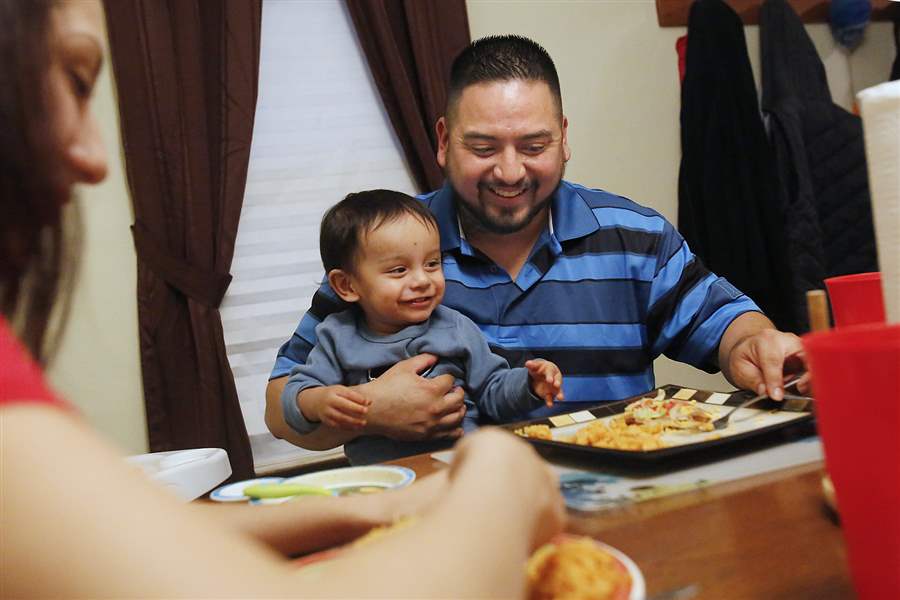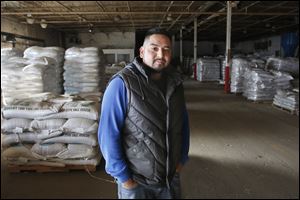
GENERATIONAL POVERTY: BREAKING THE CYCLE
Ex-Toledoan rejects anger, violence to recast his future
Family legacy filled with drugs, crime, heartbreak
12/31/2013
Rojelio Sanchez feeds his son Rojelio III, 2, with his daughter Karina, 18, at the family’s home in Napoleon. Since being released from prison in 2011, Sanchez has made it his goal to provide a better life for his family.
THE BLADE/KATIE RAUSCH
Buy This Image
Last in a series

Rojelio Sanchez feeds his son Rojelio III, 2, with his daughter Karina, 18, at the family’s home in Napoleon. Since being released from prison in 2011, Sanchez has made it his goal to provide a better life for his family.
By the time he was 5, Rojelio “Roger” Sanchez of Toledo was being forced to buy candy with food stamps so that his father could use the change to purchase booze, or alcohol-filled cough syrup or cologne.
He was arrested after ditching a 6th-grade class, found under an overpass, where the troubled youth was launching large rocks and glass bottles at panicked motorists below.
Eventually, he stopped going to school at all, because he didn’t have enough clothes to wear, Sanchez, now 36, recalls.
“Poverty; that’s all I knew,” Sanchez said. “My whole life was the Hispanic projects. My mother would have to steal food so that we could eat.”
She would also steal booze from stores, hoping that would quench her husband’s thirst and tendency to violently lash out at her and the children.
Sanchez’s “family” became the friends he knew on the streets of his Toledo neighborhood.
RELATED ARTICLES:
PART 1: Toledoans battle to reverse legacy of struggle, despair
PART 2: Basketball fund-raiser collects toys, brings community together
Several people saw potential in the youth and tried to reach out to him. Jose Luna, a longtime teacher at Toledo Public Schools, was one of those believers.
“As a boy, he was always respectful to me,” said Mr. Luna, whose job is to reach out and help at-risk Hispanic youths. “But he was a hoodlum by the 7th grade."
A teenage Sanchez sometimes sought advice from Mr. Luna; he even called his teacher late one night asking him to bail him out of jail. The teacher refused.
“I told him, ‘You figured out how to get yourself in jail, I’m sure you’ll figure how to get yourself out.’ ”
A couple of years later, Mr. Luna says he was sitting at home watching TV when he heard the news: “Rojelio had shot somebody. It broke my heart."
The Sanchez family has struggled with poverty for generations, Sanchez said. It’s a family legacy filled with drugs and violence, prison and heartbreak, suicide and murder.
His grandparents were poor farm workers who migrated from Texas. His father and uncle were drug users who unleashed their anger on their families. Both men eventually took their own lives.
Several of Sanchez’s relatives formed one of Toledo’s Latino gangs, but he declined to name the gang.
“I’m a product of my environment,” Sanchez said.
Violent father
His father, a Vietnam veteran, was violent, his anger often spiraling out of control. “He would whip us often, anywhere, in the face, legs, back,” Sanchez said.
Punishments were extreme. He would make the Sanchez boys stand in the corner for 16, 17 hours. Once their mother let the boys go to bed after their father fell asleep on the couch, he says. When his father woke up and discovered the boys missing, he beat his wife for letting the boys go to bed and then made them return to the corner.
“I had a lot of anger,” he admits.
Sanchez was 17 when he and his brother found their father in a bad way inside their home on Dec. 24, 1994.
“He had gotten arrested earlier that night and was angry,” Sanchez recalls. “He overdosed and started having convulsions and foaming at the mouth.”
According to the coroner’s report, a deadly combination of cocaine and alcohol was found in his father’s blood. His father’s brother had hung himself in a barn several years earlier, Sanchez said.
By the time he was 18, Sanchez oversaw a growing business built on illegal drug and gun sales. He was no longer the little boy who didn’t own enough clothes to attend school, and who often went to bed with an aching, empty stomach.
“Instead of McDonald’s I was buying the best steaks; I was buying the best cars and buying new ones off the lot,” he said.
Initially, he thought luck was on his side because he always seemed to triumph over the best efforts of police to shut down his operations.
Police raid
He recalls one raid when police found a stash of guns in his house, but his underage nephew took the rap for it. Sanchez ended up being charged for having a small amount of drugs in his possession and easily posted bond. He served two months in jail and four months under house arrest.
Karina Sanchez, now 18, and his oldest child, remembers that raid differently.
“I just remember the cops breaking down the doors and then saying ‘We’re going to take you away from your parents,’ ” Ms. Sanchez said. “I was more scared of the [police] dogs than the police. I didn’t know why they were there.”
Sannchez was too preoccupied with other matters to notice.
The richer and more powerful he became on the streets, the more paranoid he grew. Sanchez and his wife started staying at different hotels and relocating his stash of money, drugs, and guns constantly because he believed everyone was gunning for him.

Rojelio ‘Roger’ Sanchez, who moved to Napoleon for a better life, works as a manager of a seed supply firm.
End of business
His business came to a bloody, nightmarish end on a hot summer night in 1999.
Sanchez had converted a Lincoln town car into a low rider and decided to show it off at a baseball park.
A ball game was going on, he said. A friend became angry because he thought Sanchez’s vehicle had almost struck his parked motorcycle.
Angry words and threats were exchanged. Both refused to back down in front of the crowd.
The two were separated by their friends, and started to leave the park, but not before uttering final threats.
The rest of the night seemed like a blur, everything moving in slow motion, Sanchez recalled.
He remembers driving his cousin and the cousin’s young son home. Then he recalls returning home and grabbing a gun. He knew the teams often went to bars to drink after games, so Sanchez began the hunt. At each bar he paused long enough for a drink, the alcohol steeling his nerves.
It was night by the time Sanchez drove by the home of the man he was looking for. He could see his target through the window. While standing on the front porch, Sanchez pumped bullets into his victim as the man’s wife and children watched, crying and screaming in terror.
“It’s amazing how quickly you sober up after you shoot somebody,” Sanchez said.
His victim lived; Sanchez was sentenced to prison for 11 years for attempted murder.
Latinos in prison
The number of Latinos in prison is small compared to the number of white and black prisoners, he said.
“All the Latinos welcome you with open arms,” he said. “But you’re supposed to stick together in case anything happens.”
Sanchez declined the offer to join the other Latino prisoners, a decision that often can be met with vicious beatings or death.
The streets have their own code of honor, though, and Sanchez’s reputation and gang connections had earned him the respect of other prisoners, who left him alone.
The senselessness of the shooting and the reality of prison opened his eyes, he said.
He realized it would be a struggle for his wife, Rebecca, to raise their two daughters Karina, 5, and Gabriela, 11 months, by herself.
He used the time in prison to reflect on his life, his mistakes, and the actions of his father and other relatives. He vowed to be different if given the opportunity.
He kept in constant contact with his wife and sister by exchanging letters, encouraging each other to be strong.
It wasn’t easy.
“I always had other family members in there with me,” he said. “At one point, there were six of us there at the same time.”
His relatives would ask him to deliver the bad news to his family in prison, he said. The prison chaplain was always visiting Sanchez to inform him that another cousin or relative had been murdered out in the streets.
“One day the chaplain told me, ‘Roger, your family is cursed,’ ” Sanchez said. “He didn’t mean somebody had placed a curse on us. We were doing it to ourselves.
“He meant you reap what you sow; if you continue to live the street life and continue the gang violence and drugs, you’re going to suffer the repercussions.”
Sanchez was released from prison in 2011. Returning home to his family and old neighborhood wasn’t easy.
He filled out more than 100 job applications but, not surprisingly, was quickly rejected because of his criminal record, he said.
To put food on his family’s table, he borrowed his father-in-law’s truck and collected cans and scrap metal to sell. He found odd jobs such as chopping wood. He avoided the people from his past.
“It was a humbling experience,” he said. “But I’m determined to make it because I need to be here for my family.”
Since his release, he’s become involved with the RIDGE Project, a program that works with former prisoners and encourages them to share their stories and how they’ve managed to turn their lives around.
Sanchez frequently visits schools and prisons to discourage young people from getting into trouble and explain that everyone has to be held accountable for their actions. He encourages prisoners that there is a better life waiting for them once they’re released — if they are willing to work for it.
In December, 2012, he was hired as a warehouse manager by an agricultural distribution center that’s more than a two-hour drive from his home. Sanchez, who also drove a truck, had earned a commercial driver’s license a week before going to prison.
Leaving his past
For the first six months, he made the daily commute. By summer 2013, he was promoted to warehouse manager.
By June, Sanchez had saved enough money to move his family from his longtime Toledo neighborhood to Napoleon, which is near his workplace and far enough away for him to stop worrying that his two daughters and two young sons might follow in his troubled footsteps.
Rojelio and Rebecca Sanchez, 37, now have four children: Karina, 18; Gabriela, 14; Rojelio, Jr., 21 months; and Gabriel, 6 months. Everyone is still trying to adjust to the new neighborhood.
Mrs. Sanchez explains that the family had lived in their previous neighborhood so long, that the gunshots, daily violence, and crime seemed normal.
“It’s different,” admits Mrs. Sanchez, recalling her first reaction when the family moved into their new neighborhood.
On the first day there was a knock at door. When Mrs. Sanchez went to investigate, she saw a stranger on the porch holding what appeared to be a plate of cookies.
“Dad, dad, there’s a strange woman at our door; what should I do,” his daughter yelled, according to Sanchez, who finishes the story. “I told her, “It’s OK, you can open the door.
“They do things differently out here.”
Contact Federico Martinez at: fmartinez@theblade.com or 419-724-6154.